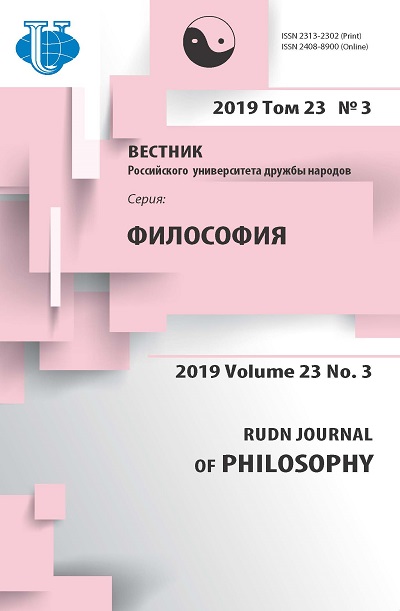TECHNOLOGY ETHICS OF N. FEDOROV AS A successor OF NIETZSCHE’S IDEA OF SELF-OVERCOMING: THE UPBRINGING OF THE SUPERMAN AND THE SCIENCE
- Authors: Kosorukova AA1
-
Affiliations:
- Peoples’ Friendship University of Russia (RUDN University)
- Issue: Vol 23, No 3 (2019)
- Pages: 363-372
- Section: SCIENTIFIC REPORTS
- URL: https://journals.rudn.ru/philosophy/article/view/21943
- DOI: https://doi.org/10.22363/2313-2302-2019-23-3-363-372
Cite item
Full Text
Abstract
The article is devoted to the consideration of the general principles of understanding of human development by N. F. Fedorov and F. Nietzsche. The article considers Fedorov’s philosophy of the common task to be a partial continuation of the general contours of Nietzsche's thought about the will to power. Nietzsche’s position is viewed through the prism of the concept of the will to power as a vital force overcoming the nihilistic devaluation of values (the ethics of vitalism). The concept of Fedorov is considered, first of all, from the point of view of his understanding of human self-improvement as the elevation of the power of human will over the blind natural elements. In this context, the question of the legitimacy of understanding Fedorov as an advocate of scientific and technological progress is considered. In the article, along with the parallels between Nietzsche and Fedorov, another idea of kinship of their philosophical optics through the understanding of philosophy as ethics is also carried out.
About the authors
A A Kosorukova
Peoples’ Friendship University of Russia (RUDN University)
Author for correspondence.
Email: kosorukova-aa@rudn.ru
старший преподаватель кафедры этики факультета гуманитарных и социальных наук
Moscow, RussiaReferences
- Sineokaya Y.V. The Problem of the Superman by Vladimir Solovyov and Friedrich Nietzsche. [cited 2019 May 1] Available from: https://runivers.ru/philosophy/logosphere/64090/. (In Russ.).
- Podoroga V.A. Nietzsche. In: New philosophical encyclopedia in 4 volumes [Internet]. Moscow: Mysl', 2010. — [cited 2019 May 1] Available from: http://iph.ras.ru/elib/2096.html. (In Russ.).
- Kosorukova A.A., Lapshin I.E., Mukhametzhanova V.S. Aesthetic Moralism as a Form of Overcoming Nihilism: Ethical-Pedagogical Ideas of F. Nietzsche. Proceedings of the II International Conference on Arts, Design and Contemporary Education; 2016 May 23—25; Moscow, Russia. Paris: Atlantis press, 2016.
- Jaspers K. Nietzsche: An Introduction to the Understanding of His Philosophical Activity. Saint-Petersburg: Vladimir Dal’; 2004. (In Russ.).
- Fedorov N.F. Countless involuntary returns or a single conscious and voluntary return? Fedorov N.F. Works. Moscow: Mysl', 1982. (In Russ.).
- Fedorov NF. Two historical types of worldviews. In: Fedorov N.F. Essays. Moscow: Mysl', 1982. (In Russ.).
- Fedorov N.F. The panlogism or illogism? In: Fedorov N.F. Works. Moscow: Mysl', 1982. (In Russ.).
- Fedorov N.F. The end of the orphanhood: unlimited kinship. Fedorov N.F. Works. Moscow: Mysl', 1982. (In Russ.).
- Fedorov N.F. The question of brotherhood, or kinship, and the causes of non-fraternal, unrelated, i.e. non-peaceful, state of the world and the means to restore kinship. In: Fedorov N.F. Works. Moscow: Mysl', 1982. (In Russ.).
- Fedorov N.F. Supramoralism, or universal synthesis (i.e. universal unification). Fedorov N.F. Works. Moscow: Mysl', 1982. (In Russ.).
- Tsvyk I.V. Moral evaluation of technique. RUDN Journal of Philosophy. 2014;(2):145—151. (In Russ.).
- Varava V.V. Moral philosophy of Nikolay Fedorov. In: N.F. Fedorov: pro et contra. V. 2. Saint-Petersburg: Russian Christian humanitarian Academy; 2008. p. 927—963. (In Russ.).
- Shestov L. N.F. Fedorov. In: N.F. Fedorov: pro et contra. V. 1. Saint-Petersburg: Russian Christian humanitarian Academy; 2004. (In Russ.). Mode of access: http://nffedorov.ru/texts/ pc/43.pdf. Date of access: 01.05.2019.
- Ilyin V.N. N. Fedorov and Saint Seraphim of Sarov. In: N. F. Fedorov: pro et contra. V. 1. Saint-Petersburg: Russian Christian humanitarian Academy; 2004. (In Russ.). Mode of access: http://nffedorov.ru/texts/pc/41.pdf. Date of access: 01.05.2019.
- Guseynov A.A. Philosophy as ethics (an experience in interpreting Nietzsche). Mode of access: http://www.nietzsche.ru/look/xxc/etika/guseenov/. Date of access: 01.05.2019. (In Russ.).
- Kosorukova AA. Consideration of the corporeal existence of man in F. Nietzsche’s ethics. RUDN Journal of Philosophy. 2015;(2):31—36. (In Russ.).
- Frolova N.A. “The truth is born in dispute” or “Philosophy of common task” against Nietzschean nihilism. Karelian scientific journal. 2016;5(1 (14)):72—75. (In Russ.).
- Korobov-Latyntsev A. Nikolay Fedorov and Friedrich Nietzsche. Two philosophies of transformation. Eros and Space [Internet]. 2014. Mode of access: http://eroskosmos.org/fedorov-and-nietzsche-two-philosophies-of-transformation/. Date of access: 01.05.2019. (In Russ.).
- Semenova S.G. Nikolay Fedorov and Friedrich Nietzsche. In: N.F. Fedorov: pro et contra. V. 1. Saint-Petersburg: Russian Christian humanitarian Academy; 2004. (In Russ.). Mode of access: http://nffedorov.ru/texts/pc/51_2.pdf. Date of access: 01.05.2019.
















